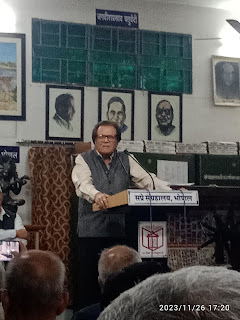Love That Spoke in Silence
By Ashish Kolarkar
The
train screeched to a halt at the small village station, its whistle cutting
through the quiet afternoon. Meera stepped out, her crisp paithani saree, a
testament to decades of hard work and perseverance. She looked around as staff
members of her Office, eagerly waiting with garlands in their hands, gathered
to welcome her. After all, she was coming there as head of an important
Department. The familiar sights of her uncle’s village brought back memories
she had buried long ago. This was no ordinary visit—it was an official tour.
But fate had other plans.
One
evening, while helping her uncle with his lectures, she met Arjun—a tall, fair
student with a commanding presence and eloquence that could captivate any
audience. Arjun wasn’t just another student; he was brilliant, ambitious, and
deeply focused on his studies. For Meera, it was admiration at first sight,
which soon blossomed into something deeper.
Their
interactions were brief but impactful. Arjun’s passion for learning and his
ability to articulate ideas mesmerized Meera. She found herself drawn to him in
ways she couldn’t explain. But while her heart raced with every meeting, Arjun
remained distant—polite but detached.
Meera’s
feelings grew stronger with time. She mustered the courage to confess her
affection, hoping against hope that he might feel the same. But Arjun’s
response shattered her world.
“You have so
much potential,” he said gently but firmly. “This is the time to focus on your
career, not love. You should aim for something greater—perhaps the Civil
Services. Love can wait; your dreams cannot.”
Before she
could process his words, he vanished from the village without a trace. No
goodbyes, no explanations—just silence. Meera felt betrayed and humiliated. Her
uncle tried to console her, but the wound ran deep.
Heartbroken
but determined not to let rejection define her, Meera returned home with a
singular goal: to prove Arjun wrong. If he believed she was capable of
greatness, she would show him just how far she could go.
The journey
wasn’t easy. Sleepless nights spent poring over books and countless sacrifices
marked her path to success. But years later, when she finally donned the
uniform of a State Civil Services officer, she felt a sense of triumph—not just
over the grueling exams but over her own insecurities.
She married a
kind man who supported her ambitions and built a life filled with purpose and
fulfillment. Yet, in quiet moments, memories of Arjun lingered like an
unfinished chapter in her story.
Now standing
in the village hall decades later, Meera scanned the room during an official
meeting with local residents. Her eyes stopped at a familiar figure seated in
the middle row—a man in his fifties with streaks of gray in his hair but the
same commanding presence she remembered.
It was Arjun.
Her heart
skipped a beat as emotions flooded back—anger, gratitude, nostalgia—all tangled
together. After the meeting concluded, she requested a private audience with
him.
When they met
face-to-face, neither spoke for several moments. Finally, Meera broke the
silence.
“You’re still
the same,” she said with a faint smile. “Do you remember me?”
Arjun nodded
slowly, his eyes glistening with recognition and regret.
“You told me
to focus on my career,” she continued, her voice trembling slightly. “And I
did. I became everything you believed I could be—and more.”
Tears welled
up in both their eyes as they shared a moment of unspoken understanding. For
Meera, it wasn’t about rekindling old feelings; it was about closure and
gratitude for the man who had unknowingly shaped her destiny.
As they
parted ways that evening under the fading sunlight, Meera felt lighter than she
had in years. Life had come full circle—not as she had once imagined it but in
a way that brought peace to her restless heart.
Arjun watched
her walk away with pride and perhaps a tinge of regret for what could have
been. But he knew deep down that he had made the right choice all those years
ago—not just for himself but for Meera too.
Some love
stories don’t end with togetherness; they end with growth—and sometimes, that’s
enough.



Comments
Post a Comment